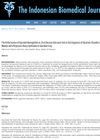 37 citations,
October 2021 in “Nutrients”
37 citations,
October 2021 in “Nutrients” Vitamin D might help regulate insulin in the body, but taking Vitamin D supplements doesn't clearly prevent or improve type 2 diabetes. More research is needed.
 45 citations,
February 2019 in “Journal of Affective Disorders”
45 citations,
February 2019 in “Journal of Affective Disorders” Melatonin improved mental health and metabolism in women with PCOS.
1 citations,
November 2023 in “Biomedicines” Menopause can cause hair thinning and texture changes due to hormonal and metabolic shifts.

Intermittent fasting slows hair growth by damaging hair follicle cells.
 14 citations,
May 2013 in “American Journal of Physiology-endocrinology and Metabolism”
14 citations,
May 2013 in “American Journal of Physiology-endocrinology and Metabolism” Removing myelin protein zero-like 3 in mice leads to better metabolism and resistance to obesity.
 138 citations,
July 2015 in “Clinical, Cosmetic and Investigational Dermatology”
138 citations,
July 2015 in “Clinical, Cosmetic and Investigational Dermatology” Eating less sugar, milk, and saturated fats and more vegetables and fish may help treat and prevent acne.
 10 citations,
November 2015 in “Plant Foods for Human Nutrition”
10 citations,
November 2015 in “Plant Foods for Human Nutrition” Hibiscus petals helped control blood sugar and improve liver and pancreas health in diabetic rats.
 31 citations,
February 2021 in “Nutrients”
31 citations,
February 2021 in “Nutrients” Curcumin may improve blood sugar levels and cholesterol in people with PCOS, but more research is needed.
 January 2025 in “Heliyon”
January 2025 in “Heliyon” Tamsulosin and finasteride have similar effects on blood sugar control in men with type 2 diabetes.
 39 citations,
January 2013 in “Indian Journal of Dermatology, Venereology and Leprology”
39 citations,
January 2013 in “Indian Journal of Dermatology, Venereology and Leprology” Eating high glycemic foods and drinking milk may worsen acne by increasing insulin and IGF-1 levels.
 7 citations,
June 2021 in “Trends in Food Science and Technology”
7 citations,
June 2021 in “Trends in Food Science and Technology” Western diet may cause male pattern baldness; low glycemic diet with magnesium could help.
 1 citations,
June 2021 in “The Indonesian Biomedical Journal”
1 citations,
June 2021 in “The Indonesian Biomedical Journal” Glycated hemoglobin is not as effective as the oral glucose tolerance test for diagnosing blood sugar problems in women with PCOS in Southern Iraq.
 91 citations,
April 2017 in “Diabetes & Metabolic Syndrome: Clinical Research and Reviews”
91 citations,
April 2017 in “Diabetes & Metabolic Syndrome: Clinical Research and Reviews” Eating fewer calories, less sugar and refined carbs, and more low-glycemic and omega-3 rich foods can help manage PCOS symptoms.
200 citations,
August 2009 in “Experimental dermatology” Eating high-glycemic foods and drinking milk may worsen acne by increasing insulin and IGF-1 levels.
 1533 citations,
October 2008 in “Endocrine reviews”
1533 citations,
October 2008 in “Endocrine reviews” Mice without the vitamin D receptor have bone issues and other health problems, suggesting vitamin D is important for preventing various diseases in humans.
 119 citations,
January 2012 in “Nutrition & Metabolism”
119 citations,
January 2012 in “Nutrition & Metabolism” Modern lifestyles, including poor diet, stress, and long-term use of certain medications, hinder the body's ability to heal from inflammation, leading to chronic diseases.
 16 citations,
March 2011 in “Pediatric diabetes”
16 citations,
March 2011 in “Pediatric diabetes” Metformin helps manage diabetes, PCOS, and weight in kids but needs more research for long-term safety.
 October 2023 in “Advancement in yoga and physical therapy”
October 2023 in “Advancement in yoga and physical therapy” More research is needed before using brown fat to treat polycystic ovary syndrome.
 August 2023 in “MOJ women's health”
August 2023 in “MOJ women's health” Brown Adipose Tissue (BAT) could potentially treat Polycystic Ovary Syndrome (PCOS) by controlling energy balance and lipid homeostasis, but more human research is needed.
 January 2015 in “Endocrine updates”
January 2015 in “Endocrine updates” Bariatric surgery patients need careful before and after surgery care for safety and long-term health.
 68 citations,
May 2011 in “European Journal of Dermatology”
68 citations,
May 2011 in “European Journal of Dermatology” Acne is caused by genetics, diet, hormones, and bacteria, with treatments not yet curative.
 37 citations,
June 2021 in “Journal of the European Academy of Dermatology and Venereology”
37 citations,
June 2021 in “Journal of the European Academy of Dermatology and Venereology” Adult skin quickly reacts to short-term environmental and internal stress, leading to various skin issues and the need for protective measures.
 15 citations,
January 2016 in “Przeglad Menopauzalny”
15 citations,
January 2016 in “Przeglad Menopauzalny” Eating a balanced diet with specific nutrients is important for menopausal women to manage hair loss.

research Acne
4 citations,
January 2019 Acne is a common skin condition that can be influenced by diet, lifestyle, and hormones, and requires a treatment approach that includes psychological considerations.

research Acne
2 citations,
May 2011 in “Harper's Textbook of Pediatric Dermatology” Acne is a common skin condition linked to diet, hormones, and genetics, and early treatment can prevent scarring.
 49 citations,
July 2021 in “Nutrients”
49 citations,
July 2021 in “Nutrients” Eating healthy, exercising, and taking certain supplements can help manage Polycystic Ovary Syndrome symptoms.
 43 citations,
August 2010 in “Expert Opinion on Investigational Drugs”
43 citations,
August 2010 in “Expert Opinion on Investigational Drugs” Inhibitors of 11β-HSD1 show potential for treating type 2 diabetes but require more testing for safety and effectiveness.
 6 citations,
January 2011 in “Springer eBooks”
6 citations,
January 2011 in “Springer eBooks” Nutrition is important for skin health, and changing diet can help prevent and treat skin diseases.
4 citations,
December 2021 in “Pharmacological Reports” Metformin is less effective in men with early-onset hair loss.
54 citations,
October 2010 in “Clinics in dermatology” Diet, especially dairy and high-sugar foods, can cause acne.

























